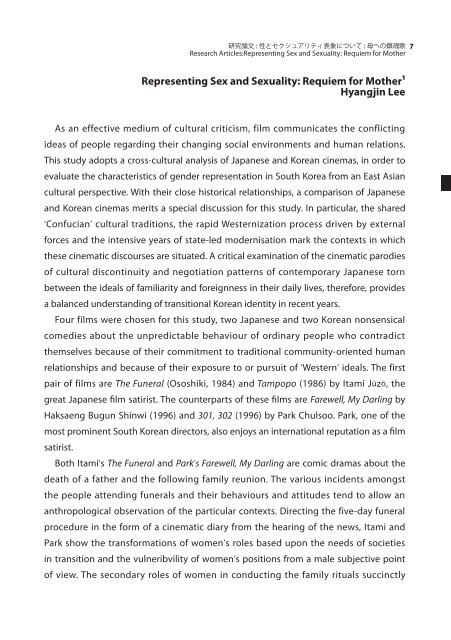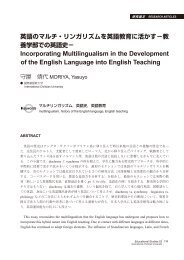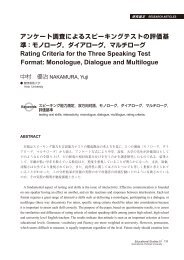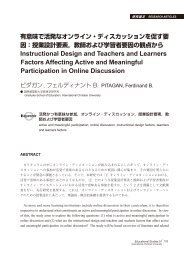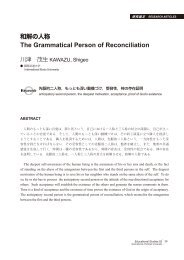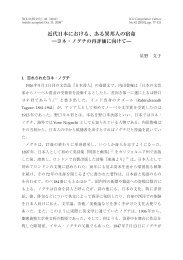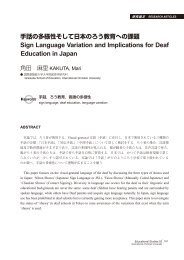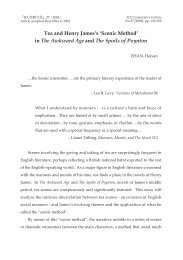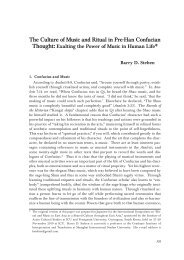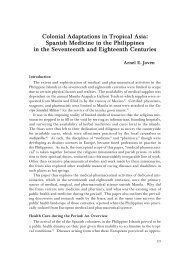Untitled - subsite - å½éåºç£æ大å¦
Untitled - subsite - å½éåºç£æ大å¦
Untitled - subsite - å½éåºç£æ大å¦
Create successful ePaper yourself
Turn your PDF publications into a flip-book with our unique Google optimized e-Paper software.
: : <br />
Research Articles:Representing Sex and Sexuality: Requiem for Mother 7<br />
Representing Sex and Sexuality: Requiem for Mother¹<br />
Hyangjin Lee<br />
As an effective medium of cultural criticism, film communicates the conflicting<br />
ideas of people regarding their changing social environments and human relations.<br />
This study adopts a cross-cultural analysis of Japanese and Korean cinemas, in order to<br />
evaluate the characteristics of gender representation in South Korea from an East Asian<br />
cultural perspective. With their close historical relationships, a comparison of Japanese<br />
and Korean cinemas merits a special discussion for this study. In particular, the shared<br />
Confucian cultural traditions, the rapid Westernization process driven by external<br />
forces and the intensive years of state-led modernisation mark the contexts in which<br />
these cinematic discourses are situated. A critical examination of the cinematic parodies<br />
of cultural discontinuity and negotiation patterns of contemporary Japanese torn<br />
between the ideals of familiarity and foreignness in their daily lives, therefore, provides<br />
a balanced understanding of transitional Korean identity in recent years.<br />
Four films were chosen for this study, two Japanese and two Korean nonsensical<br />
comedies about the unpredictable behaviour of ordinary people who contradict<br />
themselves because of their commitment to traditional community-oriented human<br />
relationships and because of their exposure to or pursuit of Western ideals. The first<br />
pair of films are The Funeral (Ososhiki, 1984) and Tampopo (1986) by Itami Jūzō, the<br />
great Japanese film satirist. The counterparts of these films are Farewell, My Darling by<br />
Haksaeng Bugun Shinwi (1996) and 301, 302 (1996) by Park Chulsoo. Park, one of the<br />
most prominent South Korean directors, also enjoys an international reputation as a film<br />
satirist.<br />
Both Itamis The Funeral and Parks Farewell, My Darling are comic dramas about the<br />
death of a father and the following family reunion. The various incidents amongst<br />
the people attending funerals and their behaviours and attitudes tend to allow an<br />
anthropological observation of the particular contexts. Directing the five-day funeral<br />
procedure in the form of a cinematic diary from the hearing of the news, Itami and<br />
Park show the transformations of womens roles based upon the needs of societies<br />
in transition and the vulneribvility of womens positions from a male subjective point<br />
of view. The secondary roles of women in conducting the family rituals succinctly


